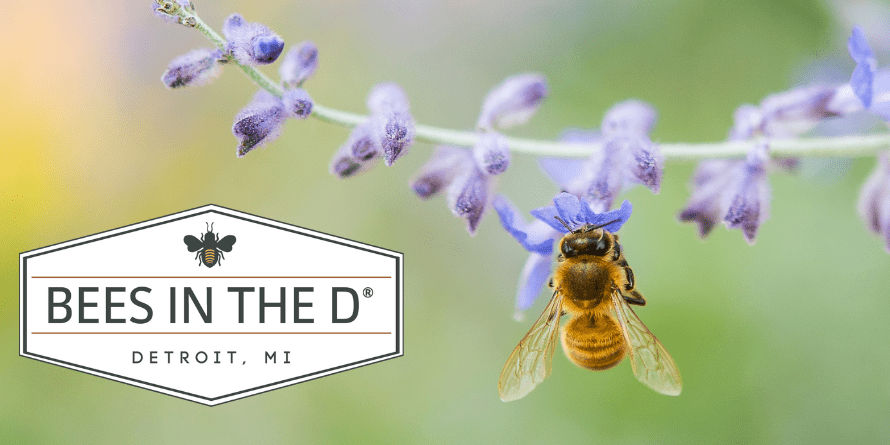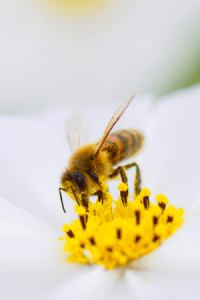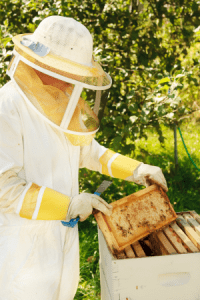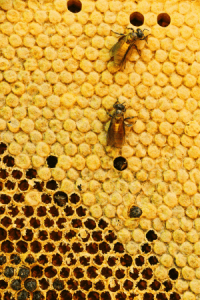
"Know Your Org" is an informational series designed to spotlight some of the wonderful organizations in our community. This month we are highlighting Bees in the D.
“Working together to make Detroit the best it can bee!” – An inspirational quote from Bees in the D founder, Brian Peterson-Roest.
Bees in the D has been an advocate and local leader for honeybee conservation in Metro Detroit since 2016. It’s a small, non-profit organization whose mission is to bring back Michigan’s declining bee population.

The use of pesticides, climate change, pollution, and habitat loss are all contributing factors to the alarming and historic decline of pollinator populations. Honeybee hives have been experiencing colony-collapse disorder, a phenomenon that occurs when the majority of worker bees leave the colony and queen bee behind. Many pathogens and diseases can bring down colonies.
In a way, beekeepers act as a facilitator by keeping the hives as healthy as they can. Pollinators are vital to a thriving ecosystem. Without pollinators, crops could not grow and there would be a global food shortage. Many people don’t realize that if we don’t act now to reverse the trend of declining pollinator populations, the devastation would be felt on a global scale. They need our help.
The mission of Bees in the D is to educate the public on the need for conservation of pollinators, especially honeybee colonies. Bees in the D has placed over 200 beehives in protected habitats across five counties in Southeastern Michigan and has introduced over 11 million bees into the local environment. The nonprofit also provides beekeeping training workshops for individuals, schools and local municipalities.
This spring, Bees in the D founder Brian Peterson-Roest and his partner and husband, Brian Roest-Peterson, will break ground on its new headquarters in Detroit, The Michigan Pollinator Center. It’s the first community education center devoted to pollinator conservation in the state. Made from upcycled shipping containers, the Center will feature a native botanical garden that will serve as a sustainable home for honeybees, butterflies and other pollinators. It is a passion project and a lifelong dream for Peterson-Roest.

Michigan native Peterson-Roest wears more than just a beekeeping hat. He’s been a 5th grade teacher in the Rochester Community School District for over 24 years and has a master’s and specialist degree in Educational Leadership and Administration from Oakland University, additionally working as an adjunct professor.
Peterson-Roest was personally honored by President Barack Obama for receiving the Presidential Award for Excellence in Mathematics and Science Teaching in 2012. He was also a recipient of the Michigan Science Teacher of the Year Award in 2011; the Humanex Excellence in Teaching Award in 2015; the Justice, Equity, Diversity, Inclusion Award in 2021; and was chosen as one of Crain’s Notable LGBTQ+ Business Leaders in 2021.
Peterson-Roest, who has always loved nature and being outdoors, jumped at the chance to go up to Lake Michigan’s Beaver Island to learn about beekeeping. The course, sponsored by Oakland University and the local gardening club, gave him a new purpose in life. In addition to bringing bee-themed science lessons back to his 5th-grade classes, Peterson-Roest wanted to advocate for the bees, so he became a beekeeper.
On a trip to New York City, he was inspired by BeeVillage, an urban apiary (a collection of beehives) nestled among the soaring skyscrapers and concrete jungle of Battery Park in Lower Manhattan. This experience led him to research the idea of bringing beehives to the city of Detroit, where more and more urban gardens were springing up. And, if beehives were placed within a 2-mile radius of an urban garden, the organic yield increased by 70%. That’s huge!
 However, starting a nonprofit from the ground up takes substantial capital, so Peterson-Roest went on The Wheel of Fortune in 2015 and won some serious prize money. Along with community partnerships and support from local businesses, Bees in the D was up and running.
However, starting a nonprofit from the ground up takes substantial capital, so Peterson-Roest went on The Wheel of Fortune in 2015 and won some serious prize money. Along with community partnerships and support from local businesses, Bees in the D was up and running.
It might be hard to imagine Detroit as a hub of beehive activity. Detroit has an industrial history and an edgy urban setting, but more local companies are looking for ways to reduce their carbon footprint and invest in environmentally conscious, sustainable initiatives—a component of Detroit’s rebirth and urban renewal plan. Bees in the D plays a key role in these initiatives.
In June 2017, Bees in the D added honeybee hives to the repurposed helicopter landing pad on the rooftop of the Cobo Center. In Sterling Heights, the group joined forces with four other partners to establish hives at a Fiat Chrysler Automobiles factory. Bees in the D also collaborated with FCA to support a colony of honeybees at the company’s Sterling Heights Assembly Plant in a natural area of the facility that is ideal for supporting beehives.
In addition to placing beehives around Detroit, Bees in the D collaborates with local businesses to provide honey and wax for a variety of products like chocolate, lip balm, soap and candles. Local restaurants are even serving the organization's locally produced honey in their food and cocktail menus. Now that’s a sweet deal!
Want to get involved and support local bee populations? Bees in the D accepts donations and is always looking for volunteers to help with a variety of tasks, offering opportunities for both kids and adults.



Add a comment to: Know Your Org: Bees in the D